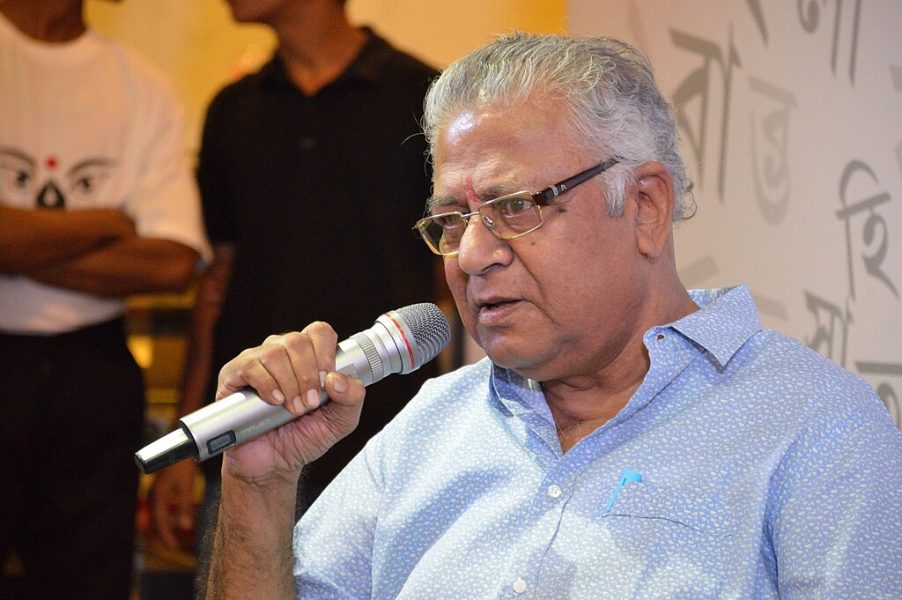
Bengali literature loses a star as Samaresh Majumdar, chronicler of ‘spring thunder’, dies

Bengali literature lost one of its titans on Monday (May 8) with the death of Samaresh Majumdar. The Sahitya Akademi Award-winning author, who was best known for portraying the tumultuous Naxalite period of the 1970s, breathed his last at a private hospital in Kolkata. He was 79.
“He had been suffering from Chronic Obstructive Pulmonary Disease (COPD) for more than 12 years. His health deteriorated recently and he was put on ventilator. He died around 5.45 pm,” a hospital official told PTI on Monday.
The North Bengal effect
The giant of post-modernist Bengali literature spent much of his childhood in the tea gardens of North Bengal, and this experience left an indelible mark in his writings. For instance, the first book (Uttaradhikar) of his famous trilogy based on the turbulent 1960s and ’70s — the other two being Kalbela and Kalpurush — reflected his growing-up years in North Bengal.
Also read: Perumal Murugan’s Tamil novel ‘Pyre’ longlisted for International Booker Prize 2023
Generations of Bengali youth in the years to come grew up captivated about the Naxalite movement’s “spring thunder” — which started in the tea gardens of Bengal and swept the state’s mind space — thanks to Majumdar’s works. The second book of the trilogy — Kalbela, which captured the peak of the movement — earned Majumdar the Sahitya Akademi Award in 1984.
His days spent in the Dooars region of North Bengal and his early friendship with tribal and migrant tea garden communities was reflected in many of his writings, which were marked by a gentle understanding of human nature and society and their interplay. “You cannot take the hills of north Bengal out of me … What I have become is because of North Bengal, what the place has given to me,” he had once told PTI at a literary meet.
Student politics
Majumdar was also deeply influenced by his student days at Kolkata’s Scottish Church College. “Without a first-hand knowledge of the turbulent student politics of the late 1960s and 1970s, I could not have fleshed out the character of Animesh (the protagonist of the trilogy) and his friends,” Majumdar had told PTI in 2017.
Majumdar, who started his literary career in the 1960s, went on to write more than 200 novels and short stories in different genres, including fiction, thrillers, children’s literature, and travelogues. His first story appeared in the literary magazine Desh in 1967 and his first novel was Dour.
Also read: Stark feminist themes of Ambai’s Sahitya Akademi winning work
His popular novels included Bandinibash, Daybadhha, and Saatkahon, while his detective series on the character Arjun remains extremely popular among teens and youths. Kalbela and another novel, Buno Hansh, were adapted into Bengali films.
Condolences pour in
West Bengal Chief Minister Mamata Banerjee condoled Majumdar’s death, saying it was an irreparable loss to the literary world.
Noted film director Goutam Ghosh said Majumdar was the one who brought forth the turbulent phase of the 1970s in North Bengal. “The period from 1960s to 1980s in North Bengal, the social and economic situation, the dreams and frustrations of the people in the Dooars came alive in his works. I regret not having met him in recent times despite hearing that he was not keeping well,” he said.
A grief-stricken Shirshendu Mukhopadhyay, another leading literary figure in Bengal, said, “Samaresh was younger than me. He is gone but his work will live on. He will be remembered by Bengali-speaking audiences around the world.”
Also read: Bengali confrontationist persona and contemporary realities
Apart from Sahitya Akademi, Majumdar had received numerous awards, including the Bankim Puraskar, the Ananda Puraskar, and the Banga Bibhushan Samman conferred by West Bengal government in 2018.
(With agency inputs)

